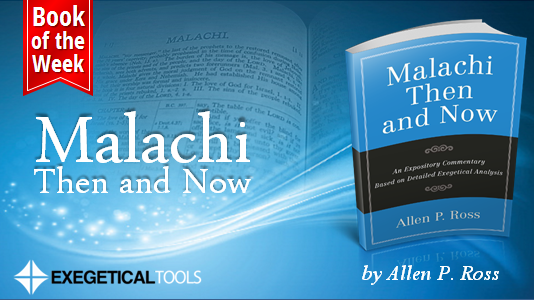Want to refresh and improve your Hebrew while studying an OT prophet closely?
I’m always on the lookout for resources that help you naturally improve your biblical language skills. I love some of the NT Greek guides that are being published, and the Baylor Handbooks on the Hebrew Old Testament are helpful as well. However, they are not intended to be commentaries on the meaning of the text, nor do they deal with theology.
Malachi Then and Now
Allen P. Ross has tackled an ambitious project: to explain the difficult grammar and morphology throughout the entire book of Malachi while also commenting on the structure, meaning, and theology of every paragraph in the book. Additionally, he gives sermon ideas such as the main expository idea of each passage and suggested applications to the modern day. I’m really, really excited about this book and I’m hoping more like it come out soon.
How it Works
As always happens, while focusing on Greek for the past couple years my Hebrew has lagged behind. Fortunately, then, I’m a great audience for this book.
Ross has an extensive introduction on exegetical method (~20 pages) which would be useful to a pastor who never received formal training or a formal method. It’s basically a mini version of Stuart’s Old Testament Exegesis. This includes 10 pages of categorized bibliography with suggested resources.
Each passage is then explored: first the language, then the meaning and theology, and then homiletical suggestions. Ross provides his own translation with textual footnotes explaining detailed issues. Next is an explanation of the literary context, followed by exegetical comments. These comments explain select difficulties in the Hebrew such as irregular morphology and the use of different tenses. Sparse footnotes keeps the explanations from getting bogged down.
Since the analysis of the Hebrew is not comprehensive as with Hebrew handbooks, the reader is expected to read from the Hebrew text oneself and use Ross as a guide. Positively, the reader must get into the text oneself, which forces immersion in the text and critical thinking. Negatively, those who are really rusty with morphology and syntax may need more help than Ross provides. However, there are no guides that I know of that help readers with the morphology of Greek or Hebrew texts throughout an entire book, so that’s not much of a knock against Ross.
In the next sections, Ross moves toward the sermon with an exegetical outline, exegetical summary, a lengthy commentary in expository form, and finally the expository idea and application. If I could make one suggestion, it would be to shorten the commentary in expository form since it is a little redundant after the exegetical comments, and I would prefer those extra pages to be replaced with a little more help with morphology for pastors who haven’t had time to keep up with theirs.
The end of the book synthesizes the biblical and theological emphases of Malachi that have been brought out in each passage of the book.
Why You Should Buy It
First, it gets you in the Hebrew text. I recommend any resource that motivates you and helps you to work through Greek or Hebrew texts of the Bible. The best way to practice any language is to make sure you’re immersed in it for any amount of time each day.
Second, this book is truly a one-stop-shop for pastors to prepare a sermon on Malachi. I’m happy that this book may encourage more pastors to tackle preaching an entire prophetic book, something that I have rarely heard. The pastor can (and probably should) supplement Ross’s work with another commentary or two, but my point is that if a pastor only had the time for bare bones study, this book could do the job.
Third, if you’re like me, you need motivation to get into a language that is not one you’re forced to work with consistently. A book like this, sitting on the side of your desk begging to be cracked open each day, will do just that. If you’re feeling quite rusty, this is the book for you.
Preview or buy it here on Amazon.



3 comments